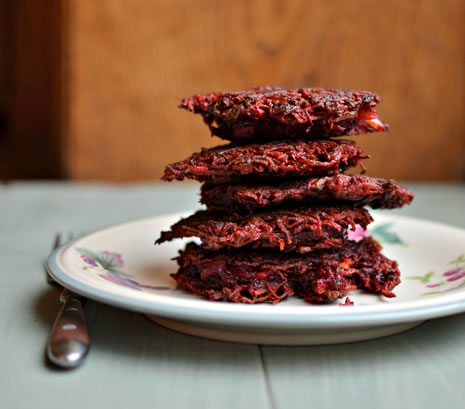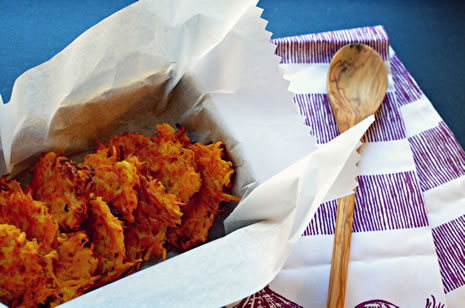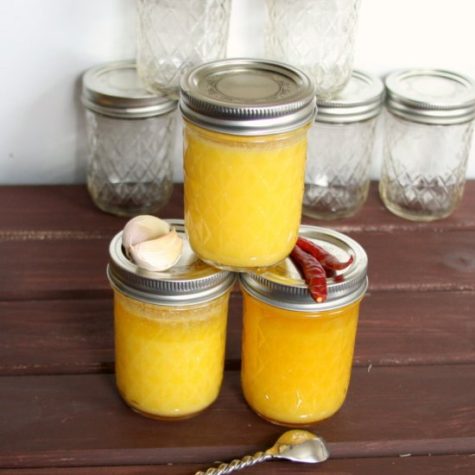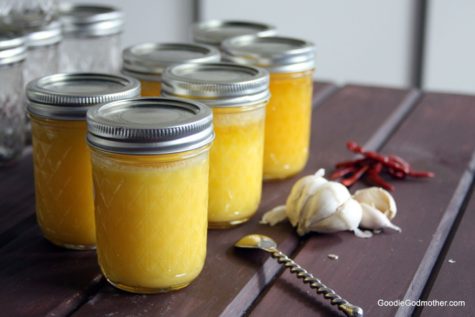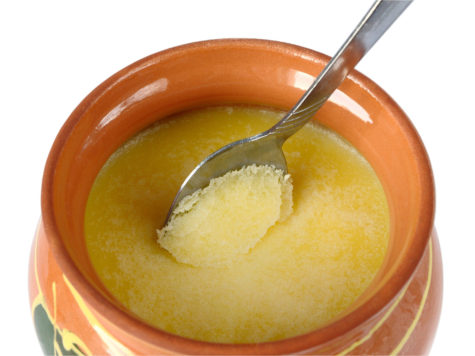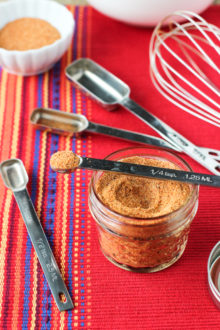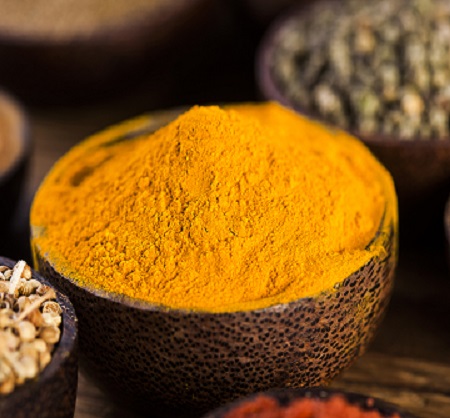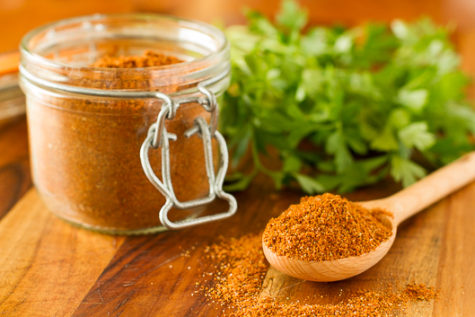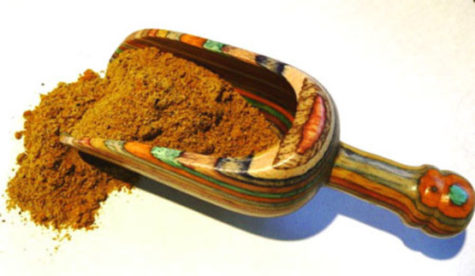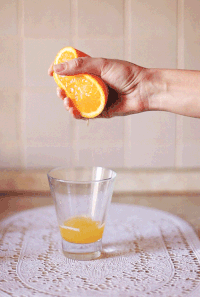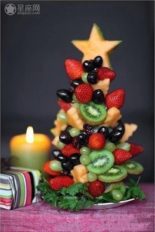Monthly Archives: December 2016
Beet Latkes stuffed with Goat Cheese
Beets and goat cheese are a classic pairing, most typically found in salads, but I’ve given them a new spin in this latke recipe, and let me tell you—they are INCREDIBLE.
You’ll want to freeze the goats cheese slightly so that it doesn’t ooze out while frying, so that’s our first step. Slice the goats cheese thinly and put it in the freezer.
Now you’re ready to fry and assemble the latkes. Adding a piece of carrot to the oil any time you’re frying helps absorb the burnt taste. When the carrot starts to look shriveled, remove it and put in a fresh piece. It works. Trust me. I take my frying carrots very seriously.
Ingredients:
- 20 oz. shredded raw beets
- ½ a large onion, shredded or finely diced
- 2 eggs
- ¼ cup flour
- 1 tsp. kosher salt
- goat cheese (I used a 7oz. tube)
- oil for frying
Directions:
Finely slice the goat cheese into rounds and freeze for 15-20 minutes. Mix the shredded beets, onion, flour, eggs and salt. Pour 2-4 tbsp. of oil into the frying pan and heat on medium-high. Use a spoon, or a small measuring cup (1/8 cup) to scoop up the batter. Gently place a spoon of batter in the pan and flatten it. Place a piece of goat cheese on top of the batter, then cover the goat cheese with another scoop of batter. Fry for 3-4 minutes, then gently flip the latkes and fry for another 1-2 minutes on the second side. When ready, the latkes will be crisp on the outside and soft on the inside, with the goat cheese deliciously melted. Repeat until batter is finished.
Yields: 12 latkes.
Source: Chabad
Butternut Squash Sweet Potato Latkes
Instead of making sweet potato pie for Thanksgiving, and potato latkes for Chanukah, try these sweet potato butternut squash latkes. You’ll get the flavors of Thanksgiving but the crispy fried texture of Chanukah.
Two tips for latke making:
- Stick a small piece of carrot in the oil. The carrot absorbs the burnt taste the oil sometimes gets. When the carrot looks dark ad shriveled, take it out and replace with a new one.
- To make the latkes a uniform size, use a 1/3 cup measuring cup to scoop up the batter.
Ingredients:
- 1 butternut squash
- 2 Yukon Gold potatoes
- 1 large onion
- 1 sweet potato
- 4 eggs
- ½ to ¾ cup flour
- 2 tbsp. kosher salt
- Olive oil for frying
- Optional: If you’re serving these at a dairy meal, throw in ½ cup grated parmesan cheese
Directions:
Dice and sauté the onion in 2 tbsp. olive oil and ¼ tsp. salt. Peel and shred the butternut squash, sweet potatoes and potatoes. Mix all the ingredients in a large bowl. Heat olive oil in a non-stick frying pan. Scoop the batter using a measuring cup for uniformity. Drop into the hot oil (keep the flame on medium-high). Fry each latke until brown on one side—approximately 3-4 minutes. Flip and fry on the other side another minute or two, or until brown, on the second side. Remove from oil and drain on a paper towel. The paper towel soaks up the excess oil while keeping the latkes fresh. Repeat until all the batter has been fried.
Serve immediately—that is, if they make them out of the kitchen at all.
Note: Recipe makes approximately 30 medium latkes.
Source: Chabad
Winter Tea
When the chill winds blow and you feel the need for something warming, try this- it even smells of Yule.
- 1 tsp cinnamon
- ½ tsp nutmeg
- 4 whole cloves
- 1 crushed cardamom seed
Note: This recipe is for one person and is intended to have half a pint of boiling water poured over it. Allow the infusion to stand for 10 minutes before straining. You can adjust the amount of water or standing time to your own taste. If you prefer your tea sweet, add a little honey, not sugar, to the strained infusion.
Source: Live Journal
Slow Cooker Flavored Ghee
With minimal preparation time and easily available ingredients, making your own ghee is a great way to save money while eating healthy.
Ingredients:
- 1 lb unsalted butter
- 8 peeled and smashed cloves of garlic (or) 6 dried hot chili peppers (or) 2 6″ sprigs of fresh rosemary, washed and dried
Instructions:
Place your butter in your slow cooker. Add your ingredient of choice. Set the slow cooker to low and cook for 8 hours. Line a kitchen sieve with a double layer of muslin or a layer of cheesecloth and strain out the clumps in the ghee. Pour the ghee into sterile jars, cover, and allow to set. Store in a cool dark place up to 6 months.
Note: For unflavored ghee, simply omit the additional ingredients.
Author: Goodie Godmother
Flavored Ghee
In the process of clarifying butter, (Simple Recipe For Making Ghee), you can add all sorts of herbs and spices to infuse their aroma and color and give the resulting ghee a delicious taste that will give the food you prepare an even more delicious taste. When making flavored ghee, it’s better to clarify the butter with the boiling method so the herbs or spices have a chance to infuse all their taste. Add your favorite combination of herbs and spices right about when the butter is melted and leave them until the very end of the process.
Here are some popular examples (the quantities are for a pound of butter):
- Garlic ghee: 6-7 crushed or minced garlic cloves.
- Cardamom ghee: 6-7 crushed cardamom pods.
- Mint-Jalapeño ghee: 1/2 cup mint leaves and 1 large, chopped jalapeño.
- Rosemary-thyme ghee: 6 sprigs each of rosemary and thyme.
- Ginger ghee: 2 tbsp fresh minced ginger.
Source: Paleo Leap
Simple Recipe For Ghee
Ever used ghee? It is the best of both worlds. It has the benefits of butter without the casein and proteins that some people react to in butter.
What is Ghee?
Ghee is a traditional food that was considered sacred in some cultures. It is a form of clarified butter, made by separating the milk proteins from the pure healthy fats, creating a flavorful and delicious fat for cooking or on vegetables. In technical terms, Ghee is a clarified, unsalted butter with the milk proteins removed. It has a high smoke point, making it perfect for cooking, and an incredible flavor. Many people who cannot tolerate dairy can handle ghee and it is a revered food in Indian cuisine.
The Benefits of Ghee
Ghee is considered “liquid gold” and revered in Indian culture (and has been for centuries). When made from high quality butter, it is a great source of fat soluble vitamins like Vitamin K and is great for teeth, hair, skin and nails.
Ghee is like butter on crack. More intense flavor and more nutrients. A little bit goes a really long way and the flavor is great in many different recipes and dishes.
I like using ghee for stir fry in a wok since it has such a high smoke point and with wok cooking, only a tiny amount is needed. Ghee is also incredible on a baked sweet potato, in eggs or on steamed or roasted vegetables.
Ghee is expensive to buy but simple to make. Unlike butter, it does not need to be refrigerated (though I typically still store in the fridge) and it is great for traveling. If you’ve never tried it, I highly suggest making ghee and using it in your cooking.
How to Make Ghee:
Ingredients:
- 16 ounces (1 pound) of butter- preferably unsalted, organic and grassfed
Equipment:
- A medium size saucepan
- A fine wire mesh strainer
- Cheesecloth
- A spoon
- 16-ounce or larger measuring cup
- Clean jar for storage
Instructions:
Cut the butter into cubes and place in the saucepan. Heat the butter over medium heat until completely melted. Reduce to a simmer. Cook for about 10-15 minutes (this will vary based on how hot your stove is). During this time, the butter will go through several stages. It will foam, then bubble, then seem to almost stop bubbling and then foam again. When the second foam occurs, the ghee is done. At this point, the melted butter should be bright gold in color and there should be reddish brown pieces of milk solids at the bottom of the pan.
Let cool slightly for 2-3 minutes and then slowly pour through the wire mesh strainer lined with several layers of cheesecloth. The small bits of milk protein are usually discarded, though a friend told me that her grandmother used to mix those with flour (or almond flour) and a small amount of honey to make a flavorful fudge-like treat.
Ghee will last up to a month at room temperature or even longer in the fridge. I typically store mine in the fridge, just to be safe.
Use as a cooking oil for stir fry, to top sweet potatoes, or melted on steamed/roasted vegetables. Ghee is much more flavorful than butter, so use sparingly!
Makes: 2 cups
Author: Wellness Mama
Healthy Heart Spice Mix
- 1 part ground turmeric
- 2 parts ground cumin
- 3 parts ground coriander
- 4 parts ground fennel
Directions:
Mix the spices and store in an airtight jar. When it is time to cook the meal, steam the vegetables. Melt a small amount of ghee in the pan, and add ½ to 1 teaspoon of the spice mixture per serving. Sauté the spices until the flavor is released. Add the vegetables, sauté lightly, add salt and pepper to taste, and serve immediately.
Source: Mapi.com
Immunity Boosting Spice Mix
Here is an ayurvedic spice mixture for enhancing immunity.
Ingredients:
- 6 parts turmeric
- 3 parts cumin
- 3 parts coriander
- 6 parts fennel
- 1 part powdered dry ginger
- 1 part black pepper
- ¼ part ground cinnamon
Directions:
Roast whole cumin, coriander, fennel and black pepper and then grind the mixture into a powder. Or dry-fry them, mix all the powdered spices well and store in an airtight container in a cool place away from direct sunlight.
For daily use:
Sauté the spices in ghee, heating until you smell the aroma. Immediately remove the pan from the heat to avoid burning the spices. and sprinkle or drizzle on vegetables, rice or other grains, or cook them in vegetables like a soup.
Or add steamed vegetables to the spice mixture while still in the pan and stir. Or sprinkle them on your food if you eat your noon meal out. Add salt and pepper to taste.
This spice mixture should be used regularly to flavor one dish for the main meal of the day to boost immunity and enhance digestion.
Emotional Balance Spice Mix
- 1 part ground black pepper
- 1 part ground dried ginger
- 2 parts ground coriander
- 3 parts ground cumin
- 2 parts ground turmeric
- 1 part crushed black cumin (for women only)
Directions:
Mix the spices together and store in an airtight container. Sauté small amounts in ghee to spice vegetables and grains.
Note:
Spices contain a lipid-soluble portion and a water-soluble portion, so ideally some of the mixture should be sautéed in ghee or a healthy oil such as olive oil and added to dishes, and some cooked in the liquid portions of dishes, such as by being added to soups, stews or sauces during the cooking process. Ghee helps transport the therapeutic value of spices to the different parts of the body, so ayurveda generally recommends including a ghee-spice mixture in at least one meal of the day.
Spices are like herbs: they work gently and gradually, with the benefits adding up over time and no dangerous side effects.
Source: Mapi.com
Cholesterol-Balancing Spice Mix
Ingredients:
- 3 parts ground turmeric
- 6 parts ground cumin
- 6 parts ground coriander
- 6 parts ground fennel
- 2 parts ground fenugreek
- 1 part dried powdered ginger
- 1 part ground black pepper
Directions:
Combine the spices and store in a sealed container. When preparing your meal, sauté a teaspoon of spices in a small amount of ghee or olive oil. Combine with vegetables or grains to give them a satisfying flavor and enhance digestion. Add salt to taste.
A word of caution:
If you have a Pitta imbalance, start first by cooling Pitta dosha. Follow a low-oil Pitta-pacifying diet until your Pitta is in balance. Then use this spice mixture to help lower cholesterol.
Source: Mapi.com
